Excavation Contractors Wyandotte
Find the best Excavation Contractor in Wyandotte
Get 3 FREE Excavating Contractors quotes for your project today! Compare profiles, reviews, accreditations, portfolio, etc... and choose the best offer.
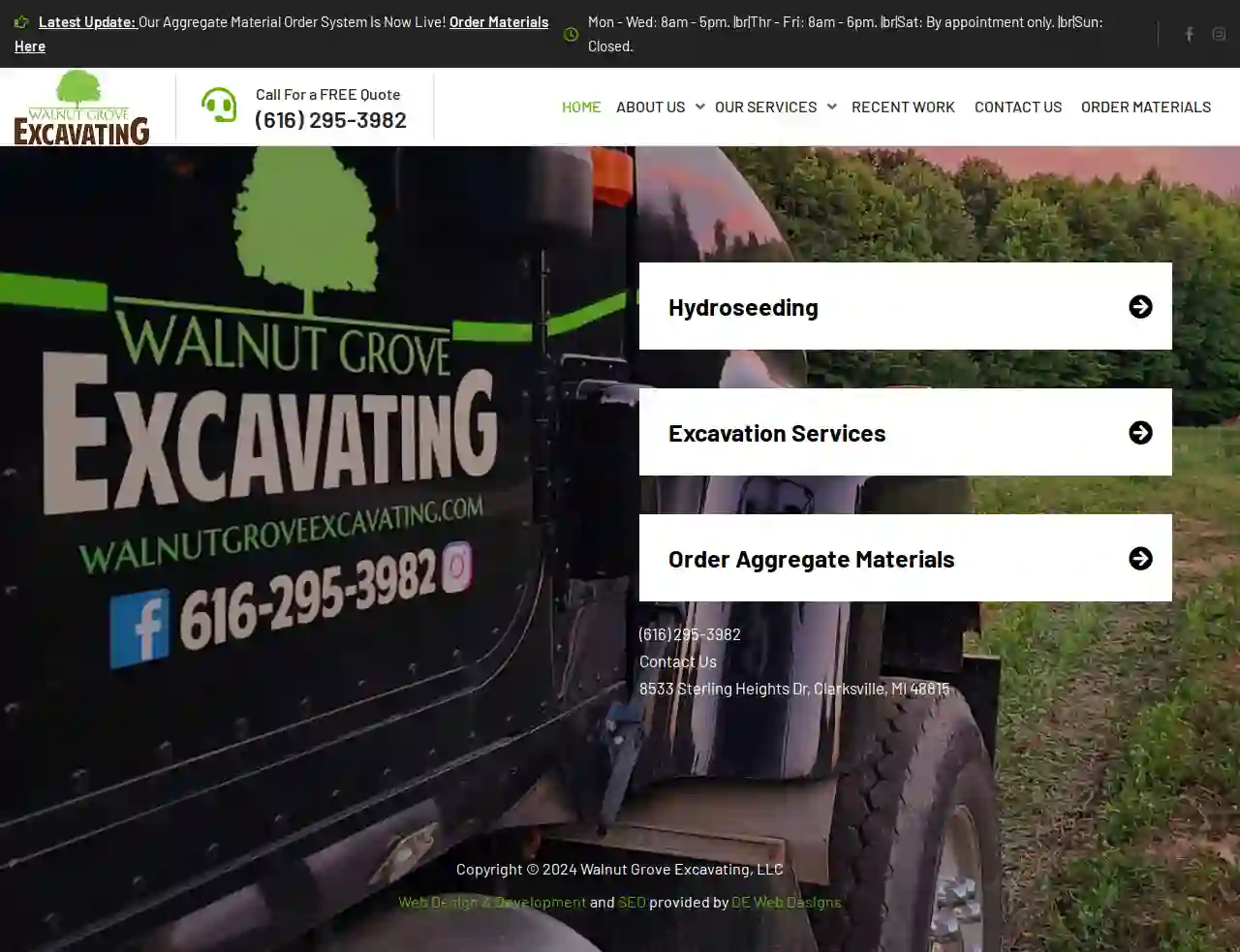
Walnut Grove Excavating Hydroseeding and Aggregates
4.9294 reviews8533 Sterling Heights Dr, Clarksville, 48815, USWalnut Grove Excavating, LLC Walnut Grove Excavating is a family-owned and operated business serving the Clarksville, MI area. We are committed to providing our clients with high-quality excavation services at competitive prices. We have a team of experienced and skilled operators who are dedicated to getting the job done right. We are fully insured and bonded, so you can rest assured that your project is in good hands. We offer a wide range of excavation services, including: Hydroseeding Septic Tank & Drain Field Installation Site Demolition & Removal Grading & Resloping Excavation & Site Balancing Land Clearing Pole Barn Grading Pool Excavation & Removal Brush Hog/Removal Tree & Stump Removal Gravel Driveway Installation Retaining Wall Installation Driveway Excavation Pond Excavation Private Road Repair Silt Fence Installation Sidewalk Removal Perk Tests Trenching for Plumbing Driveway Removal We are dedicated to providing our clients with the highest level of service and satisfaction. We are committed to working with you to ensure that your project is completed on time and within budget. Contact us today for a free quote.
- Services
- Why Us?
- Gallery
Get Quote
Linsley Excavating Inc
59 reviews7610 Division Drive, Battle Creek, 49014, USWelcome to Linsley Excavating, Inc. We're a family owned company that's been around for over 45 years. We've worked in oilfields, subdivisions and commercial properties as well as subcontracting work. We service southwest Michigan. We're a family owned company that's been around for over 45 years. We've worked in oilfields, subdivisions and commercial properties as well as subcontracting work. We service southwest Michigan.
- Services
- Why Us?
- Gallery
Get Quote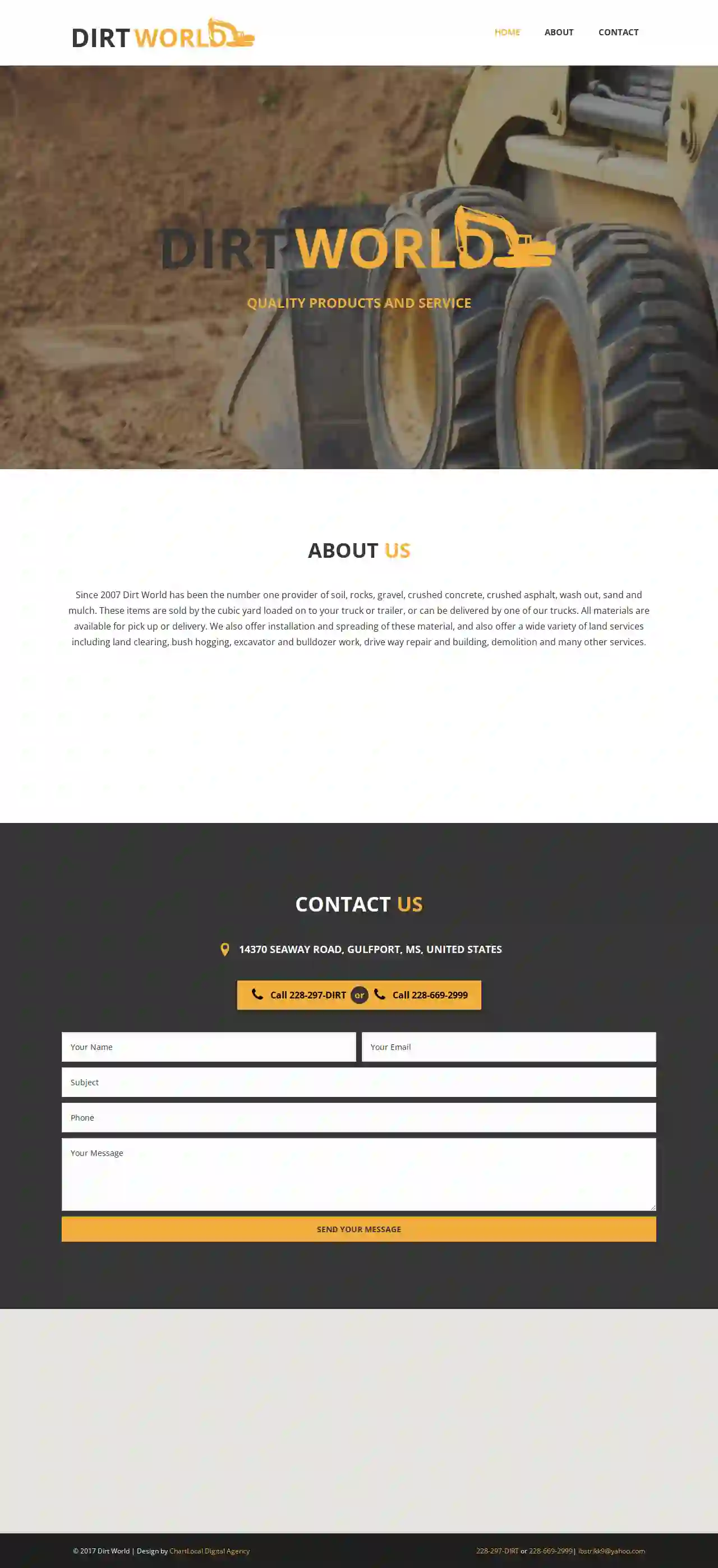
Dirt World
4.232 reviews14370 Seaway Road, Gulfport, USAbout Us Since 2007 Dirt World has been the number one provider of soil, rocks, gravel, crushed concrete, crushed asphalt, wash out, sand and mulch. These items are sold by the cubic yard loaded on to your truck or trailer, or can be delivered by one of our trucks. All materials are available for pick up or delivery. We also offer installation and spreading of these material, and also offer a wide variety of land services including land clearing, bush hogging, excavator and bulldozer work, drive way repair and building, demolition and many other services.
- Services
- Why Us?
- Gallery
Get Quote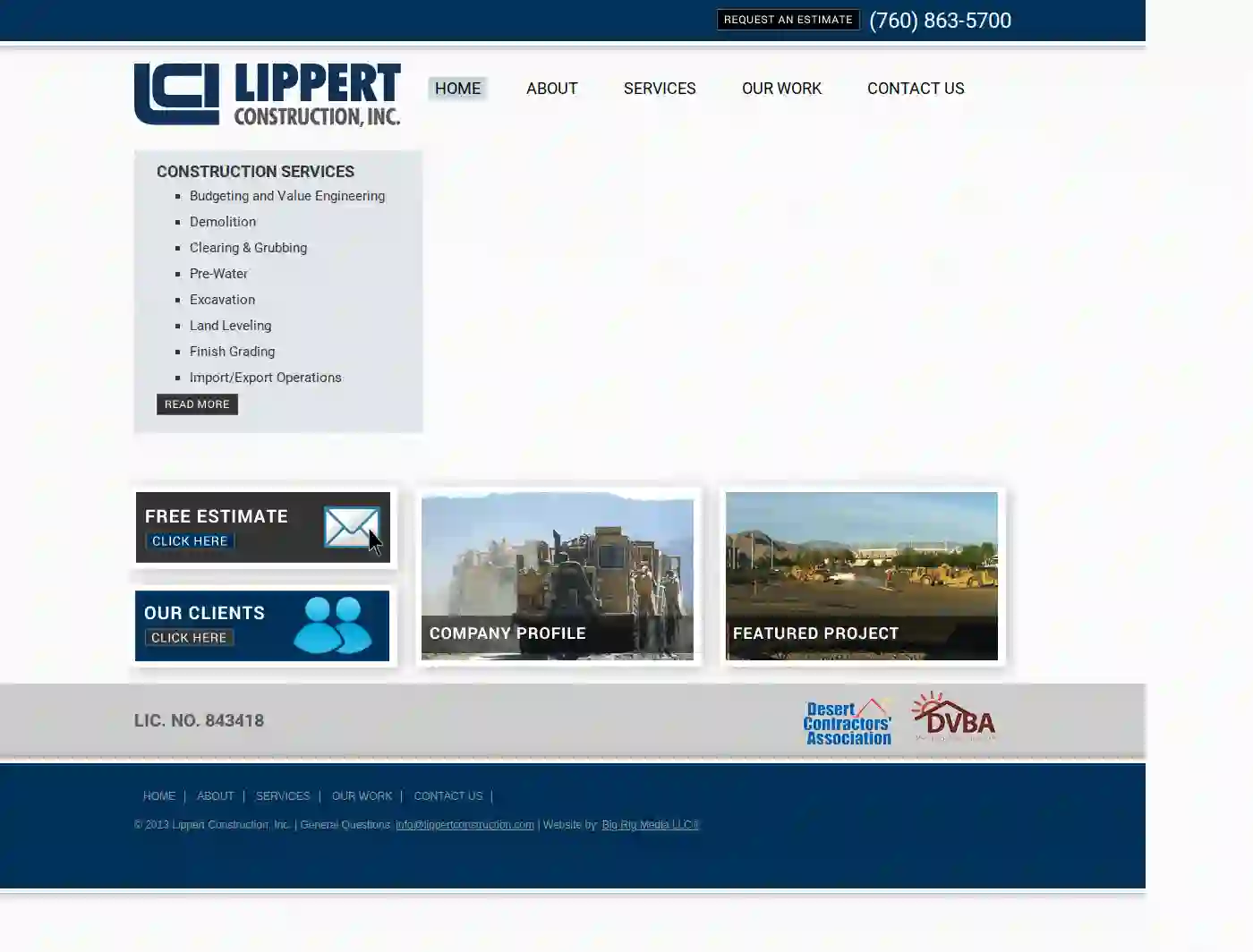
Lippert Construction
11 reviewsTroy, USLippert Construction: Your Trusted Partner for Construction Grading Lippert Construction, Inc. (LCI) is a leading provider of superior construction grading operations in the Coachella Valley. We have a proven track record of delivering high-quality results on time and within budget, earning us the trust of Southern California's premier builders and developers. Our commitment to safety is paramount. We are CPR, first aid, and AQMD certified, ensuring a secure and responsible work environment for our team and the community. With extensive experience in the Coachella Valley, we bring a deep understanding of the local landscape and regulations. Whether you need a single lot house pad, a commercial/retail center, or a large-scale subdivision or golf course project, LCI has the expertise and resources to handle any size job. We are dedicated to providing exceptional service and exceeding your expectations. Our team of skilled professionals is committed to delivering the highest quality workmanship and ensuring your project is completed to your exact specifications.
- Services
- Why Us?
- Gallery
Get Quote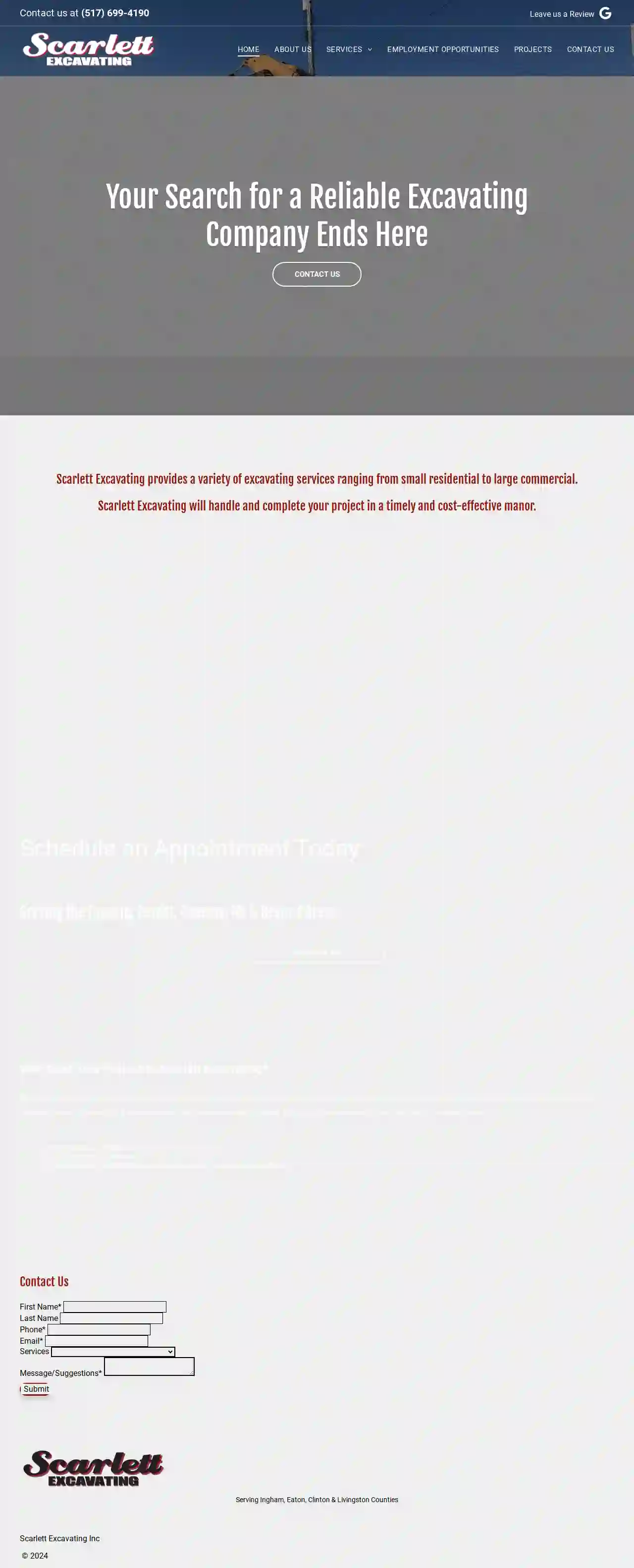
Scarlett Excavating
53 reviews16486 South Grove Road, Lansing, 48906, USAbout Scarlett Excavating Scarlett Excavating Inc. was founded in 2008 with a mission to deliver exceptional results for our clients. We are committed to providing a wide range of excavating services, from small residential projects to large commercial and industrial endeavors, all executed with professionalism and safety as our top priorities. Our team possesses the expertise and experience to handle any project efficiently and effectively. We are proud to serve the entire Central Michigan area, including Ingham, Eaton, Clinton, and Livingston counties. Our dedication to quality and customer satisfaction has earned us the trust of general contractors and project managers throughout the region. We are certified by the Lansing Board of Water and Light for drainage work, the City of Lansing for site work, and are qualified to perform jobs for the Michigan Department of Transportation (MDOT). This ensures that our work meets the highest standards and complies with all relevant regulations.
- Services
- Why Us?
- Gallery
Get Quote
Delta Excavation And Demolition
51 reviews10000 County Rd 12, 10000 County Rd 12, Kitchener, N0L 1M0, USDelta Excavation & Demolition: Your Trusted Partner for All Your Excavation and Demolition Needs Delta Excavation & Demolition is a reputable and experienced company specializing in a wide range of excavation and demolition services. We are committed to providing our clients with high-quality workmanship, exceptional customer service, and competitive pricing. Our team of skilled professionals is dedicated to delivering projects on time and within budget, while adhering to the highest safety standards. We understand that excavation and demolition projects can be complex and require careful planning and execution. That's why we take a collaborative approach, working closely with our clients to ensure their needs are met and their expectations are exceeded. From site preparation to final cleanup, we handle every aspect of the project with precision and expertise. Whether you're building a new home, expanding your business, or demolishing an existing structure, Delta Excavation & Demolition is your trusted partner. We have the experience, equipment, and commitment to deliver exceptional results. Contact us today for a free consultation and let us help you bring your project to life.
- Services
- Why Us?
- Testimonials
Get Quote
Cutting Edge Excavating
4.340 reviews5182 Chicago Dr, Hudsonville, 49426, USTHEN 2009 NOW 2023 Cutting Edge Excavating is a family-owned business founded in March 2009 by the Nykamp family, leveraging their 35 years of combined experience in the excavation industry. We began as a close-knit team of 6, driven by a shared commitment to delivering exceptional excavation services. Our dedication to growth and investment has allowed us to assemble a skilled team of 34 full-time employees. This expansion enables us to provide a comprehensive range of commercial, industrial, municipal, and residential excavation services. We own and operate a fleet of 19 local trucks, ensuring our team has the resources they need to efficiently complete projects of all sizes and complexities. This commitment to in-house equipment and personnel means we can provide our clients with greater control over project timelines and quality. In 2020, we faced a significant setback with a fire destroying our building. However, the unwavering determination of our team fueled a full recovery. We’re proud to call a brand-new facility our home, featuring a spacious 2-story, 9,000 square foot shop and office space, on the same property our old 7,800 square foot warehouse and storage facility stood, in Hudsonville, Michigan. At Cutting Edge Excavating, our mission remains clear: completing your projects on time, professionally, and at a fair price. We look forward to partnering with you on your next excavation project.. The Family
- Services
- Why Us?
- Our Team
- Gallery
Get Quote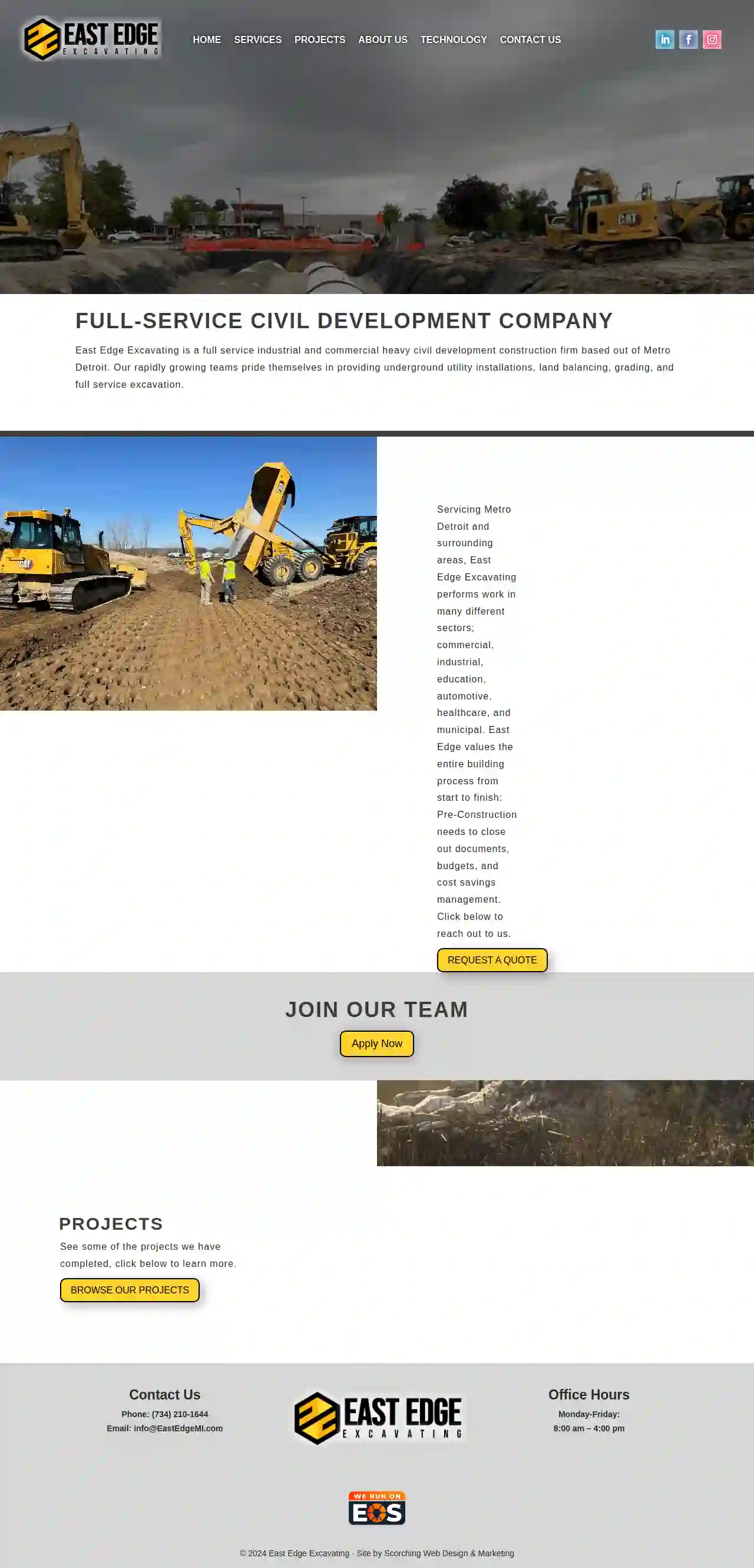
East Edge Excavating
Ann Arbor, USFULL-SERVICE CIVIL DEVELOPMENT COMPANY East Edge Excavating is a full service industrial and commercial heavy civil development construction firm based out of Metro Detroit. Our rapidly growing teams pride themselves in providing underground utility installations, land balancing, grading, and full service excavation. Servicing Metro Detroit and surrounding areas, East Edge Excavating performs work in many different sectors; commercial, industrial, education, automotive, healthcare, and municipal. East Edge values the entire building process from start to finish: Pre-Construction needs to close out documents, budgets, and cost savings management. Click below to reach out to us.
- Services
- Why Us?
- Gallery
Get Quote
C L Trucking & Excavating LLC
4.627 reviews256 E. Parameter Rd., Ionia, 48846, USAbout Us Since 1993, CL Trucking & Excavating has been serving the central Michigan area with spectacular excavation and trucking services. For 28 years, Chad Listerman, owner and founder, has built his business from the ground up. Chad began with one skid steer and a truck while working two full-time jobs and beginning a family with his wife Laura-- he has successfully put his business on the map. Serving out of Ionia County, he has turned his business into a community and employs over 70 local families. Our Guarantee We strive to create the best experience for our customers. Whether it's the quality of the project, safety for others and ourselves, working within budgets, meeting deadlines, or even the helpful, honest relationship created between the customer and the company. Our word and our handshake mean something.
- Services
- Why Us?
- Gallery
Get Quote
Rick Anderson Excavating LLC.
54 reviewsBelding, USAnderson Rick Excavating: Your Trusted Partner for Excavation and Installation Services Anderson Rick Excavating is a family-owned and operated business serving the Grand Rapids, Montcalm County, Ionia County, and Mecosta County areas. With over 30 years of experience, we've built a reputation for providing high-quality excavation and installation services at competitive prices. We're committed to delivering exceptional customer service and exceeding your expectations on every project. Whether you're planning a new construction project, need to improve existing property, or require emergency service, we're here to help. Our team of experienced professionals is equipped to handle a wide range of projects, from small residential jobs to large commercial projects. We understand that your property is an investment, and we treat it with the utmost care. We use only the best equipment and materials to ensure that your project is completed to the highest standards. We're also fully licensed and insured, so you can rest assured that your project is in good hands. Contact us today for a free estimate and let us help you bring your vision to life!
- Services
- Why Us?
- Testimonials
- Gallery
Get Quote
Over 22,076+ Excavation Contractors on our platform
Our excavation contractors operate in Wyandotte & surroundings!
ExcavationHQ has curated and vetted the Best Excavation Pros arround Wyandotte. Find a top & trustworthy business today.
Frequently Asked Questions About Excavation Contractors
- Basement Size: The larger the basement, the more excavation is required, increasing the cost.
- Soil Type: Excavating rocky or dense clay soil is generally more expensive than loose soil.
- Accessibility: Difficult-to-access sites might require specialized equipment or more labor, driving up costs.
- Foundation Type: The chosen foundation type (full basement, crawl space, slab) affects excavation needs.
- Underpinning: If underpinning (strengthening existing foundations) is necessary, it significantly increases costs.
- Disposal Fees: Hauling excavated soil to disposal sites adds to the overall expense.
- Determining Soil Suitability: Assessing whether the soil can support the intended structure or load.
- Recommending Foundation Types: Advising on the appropriate foundation design based on soil characteristics.
- Addressing Drainage and Erosion Issues: Providing solutions to manage water runoff and prevent erosion.
- Evaluating Slope Stability: Assessing the risk of landslides or soil movement on slopes.
- Building on challenging soil types (expansive clay, loose sand, etc.)
- Constructing large or complex structures
- Excavating near slopes or retaining walls
- Addressing drainage or erosion concerns
- New Construction: Laying foundations, basements, or underground utilities for new buildings.
- Home Additions: Creating space for new rooms, basements, or extensions.
- Landscaping: Leveling ground, creating slopes, installing retaining walls, or digging for ponds or pools.
- Drainage Improvement: Installing French drains, drainage ditches, or swales to manage water runoff.
- Utility Installation or Repair: Laying new water, sewer, gas, or electrical lines, or repairing existing ones.
- Demolition: Clearing debris and preparing the site after demolishing a structure.
- Excavators: Versatile machines with a bucket, arm, and rotating cab for digging, lifting, and moving earth.
- Backhoes: Similar to excavators but with a digging bucket on the back and a loader bucket on the front, ideal for trenching and smaller excavations.
- Bulldozers: Powerful machines with a large blade for pushing earth, clearing land, and leveling surfaces.
- Skid Steers: Compact and maneuverable loaders with various attachments (buckets, forks) for digging, loading, and grading in tight spaces.
- Trenchers: Specialized machines for digging narrow trenches for utilities.
- Dump Trucks: Vehicles for hauling excavated material to disposal sites.
How much does it cost to excavate a basement?
What is a soil engineer, and do I need one?
How do I know if I need excavation for my project?
What equipment is used for excavation?
How much does it cost to excavate a basement?
- Basement Size: The larger the basement, the more excavation is required, increasing the cost.
- Soil Type: Excavating rocky or dense clay soil is generally more expensive than loose soil.
- Accessibility: Difficult-to-access sites might require specialized equipment or more labor, driving up costs.
- Foundation Type: The chosen foundation type (full basement, crawl space, slab) affects excavation needs.
- Underpinning: If underpinning (strengthening existing foundations) is necessary, it significantly increases costs.
- Disposal Fees: Hauling excavated soil to disposal sites adds to the overall expense.
What is a soil engineer, and do I need one?
- Determining Soil Suitability: Assessing whether the soil can support the intended structure or load.
- Recommending Foundation Types: Advising on the appropriate foundation design based on soil characteristics.
- Addressing Drainage and Erosion Issues: Providing solutions to manage water runoff and prevent erosion.
- Evaluating Slope Stability: Assessing the risk of landslides or soil movement on slopes.
- Building on challenging soil types (expansive clay, loose sand, etc.)
- Constructing large or complex structures
- Excavating near slopes or retaining walls
- Addressing drainage or erosion concerns
How do I know if I need excavation for my project?
- New Construction: Laying foundations, basements, or underground utilities for new buildings.
- Home Additions: Creating space for new rooms, basements, or extensions.
- Landscaping: Leveling ground, creating slopes, installing retaining walls, or digging for ponds or pools.
- Drainage Improvement: Installing French drains, drainage ditches, or swales to manage water runoff.
- Utility Installation or Repair: Laying new water, sewer, gas, or electrical lines, or repairing existing ones.
- Demolition: Clearing debris and preparing the site after demolishing a structure.
What equipment is used for excavation?
- Excavators: Versatile machines with a bucket, arm, and rotating cab for digging, lifting, and moving earth.
- Backhoes: Similar to excavators but with a digging bucket on the back and a loader bucket on the front, ideal for trenching and smaller excavations.
- Bulldozers: Powerful machines with a large blade for pushing earth, clearing land, and leveling surfaces.
- Skid Steers: Compact and maneuverable loaders with various attachments (buckets, forks) for digging, loading, and grading in tight spaces.
- Trenchers: Specialized machines for digging narrow trenches for utilities.
- Dump Trucks: Vehicles for hauling excavated material to disposal sites.